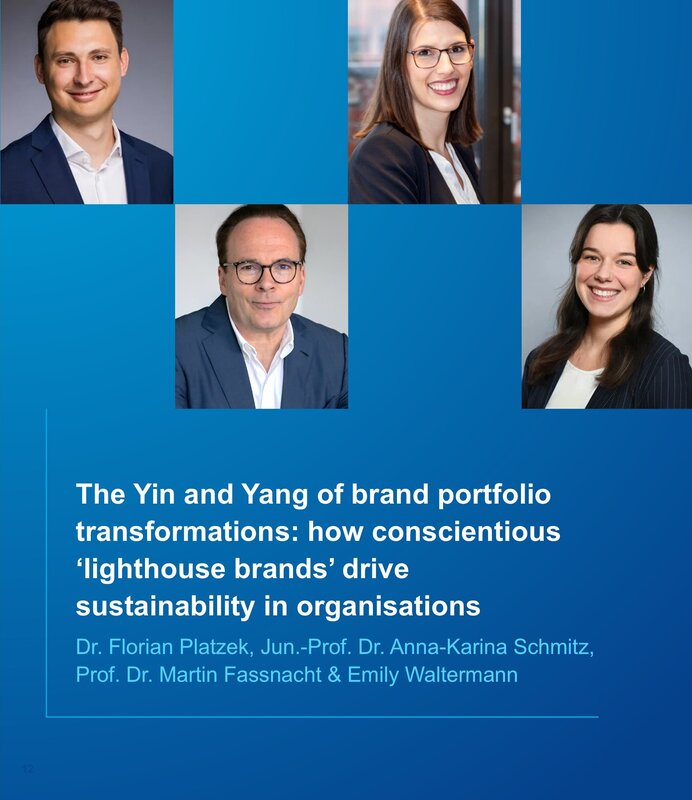A study by Florian Platzek, Anna-Karina Schmitz, Martin Fassnacht, and Emily Waltermann
We are pleased to announce the publication of the article “The Yin and Yang of brand portfolio transformations: how conscientious ‘lighthouse brands’ drive sustainability in organisations” by Dr. Florian Platzek, WHU Assistant Professor Dr. Anna-Karina Schmitz, WHU Professor Dr. Martin Fassnacht, and Emily Waltermann in the Journal of Brand Management. The study was conducted within the scope of the Henkel Center for Consumer Goods (HCCG) at WHU – Otto Beisheim School of Management.
The paper explores the dynamic interplay between conventional and conscientious brands within the context of the sustainability transformation in brand portfolios. Implementing a case study of three conscientious brands embedded in the portfolio of a leading consumer goods company, the authors investigate the mutual influence, evolving roles, and relevance of these brands, for the company as well as the market. Drawing on the metaphor of Yin and Yang, the study conceptualises conventional and conscientious brands as complementary and interdependent forces: through their established market presence, substantial revenue generation and operational expertise, conventional brands provide the stability that allows conscientious brands to grow. Simultaneously, led by their integrated moral compass, conscientious brands take on the responsibility to foster sustainability and act as catalysts for innovation across the portfolio.
The “lighthouse function” of conscientious brands emerges as pivotal: they act as trailblazers for sustainable practices, challenge the status quo, enable conventional brands, and enhance the overall sustainability image of the organisation. Through conscientious brands, the organisation can test new technologies and gather valuable consumer feedback, which informs its broader portfolio strategies.
The study addresses three core research questions:
- What drives the introduction of conscientious brands in incumbent brand portfolios?
- What roles and functions do conscientious brands fulfil within the portfolio?
- How do conventional and conscientious brands interact to enhance the incumbent’s sustainability transformation?
The authors identify key driving forces such as increasing consumer demand for sustainable products, competitive pressures, and regulatory requirements. Internal enablers include top management commitment and employees’ intrinsic motivation. At the same time, the study highlights significant restricting forces, including consumer scepticism, higher costs of sustainable materials, and internal resistance.
The findings provide novel insights to the academic literature by shifting the focus from antagonistic brand dynamics to a more integrated perspective. Moreover, they highlight functions of conscientious brands that go beyond the mere financial value—an area largely neglected in prior research—and offer practical guidance for brand portfolio transformation.
The article was produced at the Henkel Center for Consumer Goods (HCCG), a research initiative founded over 15 years ago by WHU – Otto Beisheim School of Management and Henkel AG & Co. KGaA. Dr. Florian Platzek completed his PhD under the supervision of Assistant Professor Anna-Karina Schmitz in 2024 and contributed to the HCCG over several years. Assistant Professor Anna-Karina Schmitz is Director of the HCCG. WHU-Professor Martin Fassnacht holds the Chair of Strategy and Marketing and serves as Chairman of the HCCG Advisory Board. Emily Waltermann is a doctoral student and research assistant at the HCCG.
The full article is available Open Access via Springer Nature.

